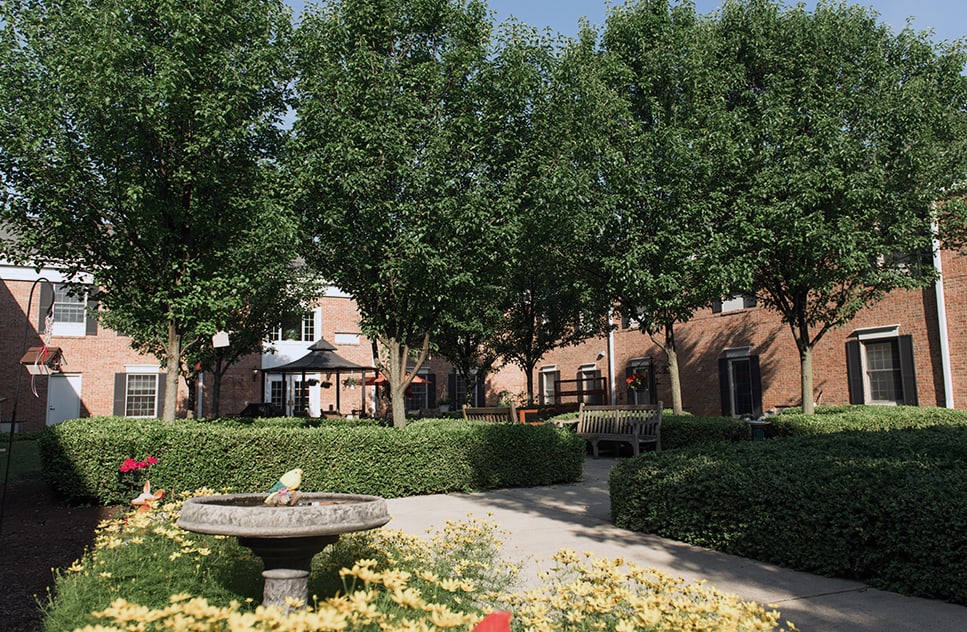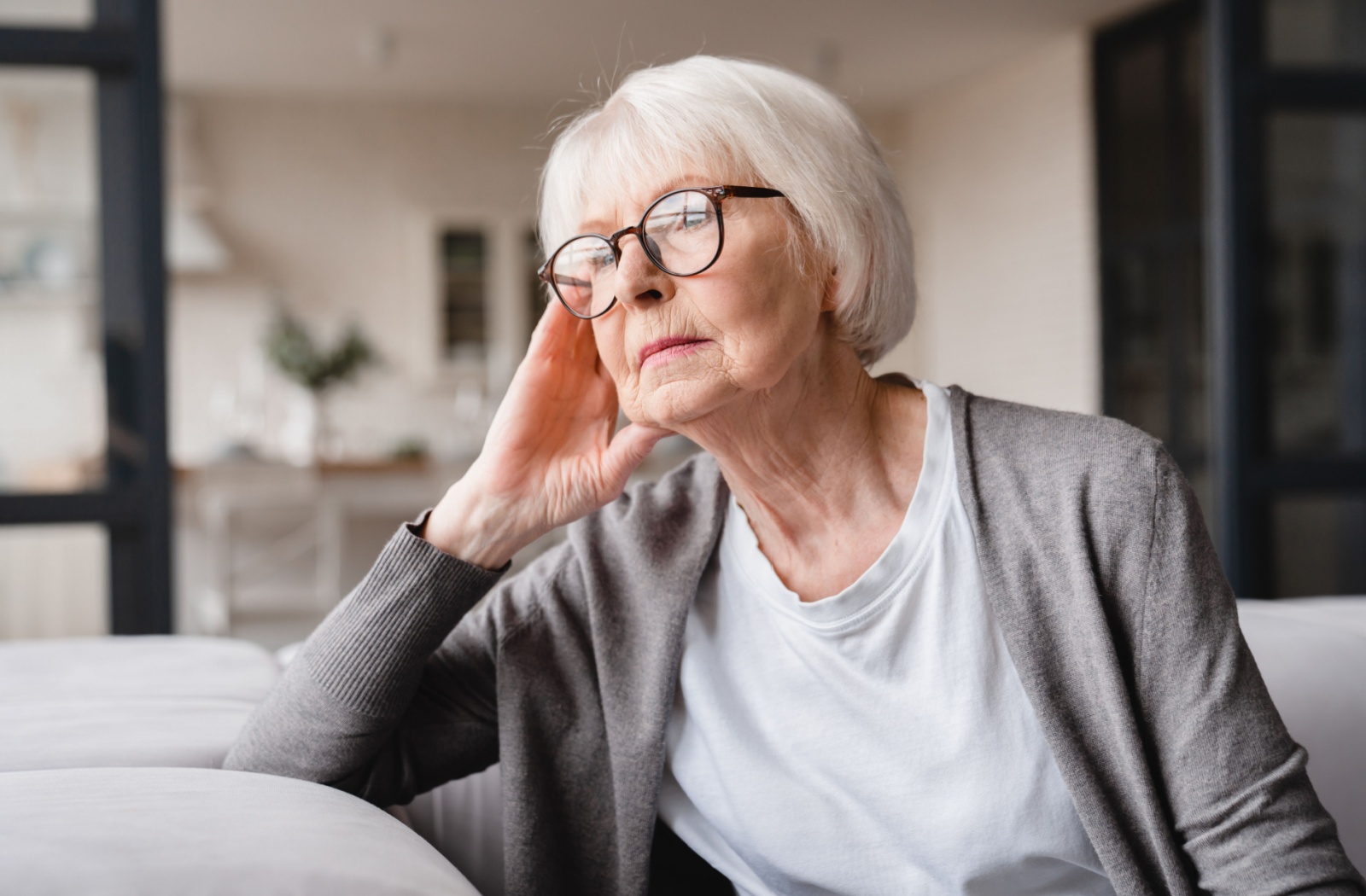As we age, our needs evolve, and sometimes living alone becomes challenging. It’s crucial to recognize when a more supportive living environment might be necessary. Assisted living communities offer the help and support needed for a healthy and happy life.
Do you know when an assisted living community might be the best option for an older loved one? Here are 11 signs that it could be time to consider this move:
- Daily tasks are overwhelming
- The home is no longer safe to live in alone
- Lack of socialization with others
- Repeated health issues
- A change in overall hygiene
- Cognitive decline
- Financial challenges
- Mobility issues
- Caregiver burnout
- Transportation concerns
- Loneliness and isolation or other noticeable shifts in disposition
At Kingston Residence of Perrysburg, we understand that every person’s situation is unique, and these signs can vary. It’s important to have open and honest conversations with your loved ones about their needs and preferences. Assisted living isn’t the end of independence but rather a way to enhance quality of life and provide ongoing support.
Daily Tasks Feel Overwhelming
When simple daily tasks like cooking, cleaning, or getting dressed become overwhelming or take significantly longer than they used to, it might be time to consider assisted living. Assisted Living communities assist with these tasks, making life easier and more comfortable.
One of the biggest indicators that daily living has become difficult is a noticeable decline in nutrition and home upkeep. Spoiled food in the fridge, stacks of unopened mail, or wearing the same clothing for days can signal that once-simple tasks are now overwhelming. Assisted living provides support with Activities of Daily Living (ADLs) such as bathing, dressing, and meal preparation, ensuring seniors receive consistent care without losing independence.
The Home is No Longer Safe
Environmental hazards such as poor lighting, falling risks, and other safety concerns can put older adults at risk of chronic health impairments. Frequent accidents or close calls at home may indicate it’s time to consider assisted living, where safety is a priority.
If you’re starting to notice unexplained bruises, repeated falls, burn marks on cookware, or 911 calls, these are serious safety red flags. Most homes were not designed for aging adults who need grab bars, accessible bathrooms, emergency response systems, or supervised care. Assisted living communities are intentionally built with fall-prevention flooring, 24/7 monitoring, and medical alert systems that protect seniors from avoidable emergencies.
Lack of Socialization
Isolation is a significant concern for older adults. If your loved one has become isolated, assisted living offers numerous opportunities to meet and socialize with peers who share similar interests and experiences. Social interaction is essential for mental health, and assisted living communities provide a vibrant setting with varied social activities aimed at fostering an active body, engaged mind, and fulfilled spirit.
Studies show that chronic loneliness can increase the risk of dementia by 31% and lead to faster physical decline. If your loved one rarely leaves home, no longer attends social events, or avoids phone calls, this isn’t simply “quiet behavior” — it may be a sign they need structured social engagement. Assisted living provides built-in community through clubs, outings, fitness classes, and shared meals, helping seniors rebuild confidence and purpose.
Repeated Health Issues
A pattern of repeated health issues might mean that regular access to medical care is needed. Assisted living provides routine medical care, enabling early detection and management of health concerns. If you’ve noticed significant changes in weight, balance, or strength, it may no longer be safe for your loved one to live alone. Assisted living can offer the necessary support to maintain health and wellness.
When chronic conditions like diabetes, heart disease, or COPD aren’t monitored regularly, emergency room visits often increase. Missed medications, skipped doctor appointments, or sudden weight loss are often quiet signs that living alone is no longer safe. Assisted living includes wellness checks, medication management, and 24/7 on-site nurse oversight that helps prevent health crises instead of responding to them.
Change in Hygiene
If your loved one’s hygiene and self-care have declined, it might be time to consider assisted living. These communities support older adults with their hygiene and personal care routines. Maintaining a clean, well-kept home is essential for physical, mental, and overall hygiene well-being.
Declining hygiene is often not laziness — it may stem from fear of falling in the shower, difficulty changing clothes due to arthritis, or even early cognitive decline. Signs include strong body odor, infrequent bathing, dental issues, or wearing dirty clothes. Assisted living provides private, respectful hygiene assistance that protects dignity while ensuring health.
Cognitive Changes
Cognitive changes associated with dementia and Alzheimer’s can lead to confusion and disorientation. Assisted living communities provide specialized care for those with memory impairments. Occasional forgetfulness is normal, but frequent issues like missed medications or appointments indicate that assisted living might be necessary to provide the needed support.
Forgetting a name occasionally is normal. Forgetting to eat, getting lost in familiar places, or repeatedly missing medication is not. Cognitive decline affects judgment, safety, and the ability to live independently, even before a formal dementia diagnosis. Assisted living staff are trained to support memory changes, provide reminders, and create structured routines that prevent confusion and anxiety.
Challenges Maintaining Finances
If bills are piling up or your loved one has fallen victim to financial scams, it may be an indicator that they need assistance. Assisted living communities offer help with financial management to ensure bills are paid on time and protect your loved one from scams.
A sudden increase in late fees, unopened mail, duplicated purchases, or difficulty balancing a checkbook can signal financial decline. Seniors are also common targets for scams and predatory marketing. Assisted living reduces these risks by taking over essential billing needs, offering guidance from financial power of attorney support, and eliminating most home-related expenses.
Mobility Issues
When mobility becomes a challenge, it might be time to consider assisted living. These communities provide mobility aids, safety features, and other support to help your loved one maintain their independence and mobility.
One in four adults over 65 falls every year, and a single fall can lead to long-term disability. If your loved one is avoiding stairs, holding onto furniture to walk, or has stopped showering due to fear of falling, assisted living can help. Communities offer grab bars, elevators, mobility support, and physical therapy programs that reduce fall risk and maintain strength.
Caregiver Burnout
Caregiving is demanding work, and it’s crucial to recognize and prevent caregiver burnout—a state of emotional, physical, and mental exhaustion caused by prolonged stress. Assisted living can help alleviate the burden, providing relief and support for both you and your loved one.
Caregiver burnout is one of the top reasons families consider assisted living — not because they don’t care, but because they do. When caregivers sacrifice sleep, work, or personal health, both people suffer. Assisted living allows family members to return to their role as spouse, daughter, or friend, instead of full-time caregiver.
Transportation Challenges
Driving and using public transportation can be difficult for older adults. Assisted living communities offer reliable, on-site transportation services for medical appointments, errands, and recreational activities.
A senior giving up driving often means more than losing transportation — it often leads to isolation, missed medical appointments, and dependence on family for basic errands. Assisted living solves this with scheduled transportation, on-site services, and planned outings that keep residents active and connected.
Loneliness and Mood Changes
If loneliness has become a persistent issue, it may be time to consider assisted living. These communities provide an environment where older adults can feel connected and engaged with others daily. Major changes in mood or behavior may indicate that living alone is becoming too challenging. Assisted living offers the social interaction and support needed to enhance mental health.
Withdrawal, irritability, or sudden mood shifts often signal emotional distress, not personality change. Loneliness has been shown to be as harmful to health as smoking 15 cigarettes a day. Assisted living restores connection through shared dining, peer friendships, and mental wellness programming that reduces the emotional burden of living alone.

Sound Familiar? It Might Be Time to Consider Assisted Living
Recognizing these signs can help you and your family make informed decisions about assisted living communities. It’s important to monitor these indicators closely as they can significantly impact your loved one’s quality of life. By being proactive and aware of these changes, you can ensure that the transition to assisted living is made smoothly and without the pressure of a crisis situation.
Assisted living provides a supportive environment tailored to meet the needs of older adults, ensuring their safety, health, and overall well-being. Whether it’s help with daily tasks, managing medical needs, or fostering social connections, these communities are designed to enhance the quality of life for your loved one.
At Kingston Residence of Perrysburg, we understand how challenging this decision can be and are here to offer support and compassion during your loved one’s later years. Our dedicated team is committed to providing personalized care and creating a nurturing environment where residents can thrive. Contact us today for more information and to see how we can assist you in making this important transition.






